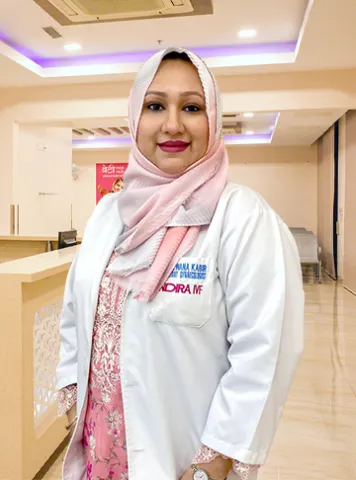Introduction
IVF has been a lifesaver to numerous couples all over the world who have been suffering from infertility. Even with the vast majority of factors influencing treatment effectiveness, age is still regarded as one of the most important determinants. The ability of the ovaries to produce healthy eggs naturally declines with age, and this directly impacts the chances of achieving a successful pregnancy through IVF. According to the World Health Organisation (WHO), age-related reduction in fertility is the primary cause of infertility, which affects around one in six (around 17.5%) people worldwide.
IVF Success Rates and Age - Why It Matters
A woman's egg supply is limited, and as she ages, both the quantity and quality of her eggs decline. The drop further increases past the middle of the 30s, which is why there are fewer chances of fertilisation, and the probability of chromosomal anomalies increases.
- The egg quality, embryo growth and implantation rates are usually higher in younger women.
- Women who are above 35 years might have less ovarian reserve and hence more cycles are needed to get pregnant.
- Success rates sharply decline beyond the age of forty, and the chance of miscarriage rises.
Understanding this age effect can assist couples to make wiser choices and to consult medical advice in time.
IVF Success Rates Across Different Age Groups
Women's biological infertility typically occurs 10–12 years before the time of menopause, and most women enter menopause in their early fifties. Fecundability, which is the chance of conception in one menstrual cycle, has been documented to decline starting from the early 30s and to sharply diminish beyond the age of 35.
IVF Success Rates Under 35
The success rate of IVF is generally the highest for women under 35. This is so because the eggs of these women are more likely to be chromosomally normal; thus, better fertilisation and a higher implantation probability. Based on the data from the Centres for Disease Control and Prevention (CDC), the average rate of live birth for women under 35 is about 40–50% per IVF cycle.
Several factors can influence outcomes, including:
- Number of embryos transferred: The process of transferring multiple embryos leads to a higher chance of conceiving; at the same time, it also elevates the risk of giving birth to multiples.
- Embryo quality: The quality and developmental potential of the embryos are the decisive factors in the achievement of implantation.
- Uterine receptivity: The nature of the uterine lining is of prime importance for embryo implantation.
- Lifestyle factors: Positive practices like consuming a balanced diet, engaging in regular physical activity, and abstaining from smoking and drinking excessively can greatly contribute to successful IVF.
Although the IVF success rates under 35 Bangladesh remain the main source of encouragement, it is essential to have a realistic approach towards IVF. Not every attempt will result in a pregnancy; hence, the availability of emotional support is very important throughout the journey.
IVF Success Rates Under 40
As the years go by, and women reach 40 and then go beyond, the quality of the eggs is degraded. This is the reason why IVF results are less successful for them compared to those of younger age. The average live birth rate per IVF cycle for women aged 35–37 is 30–35%. The IVF success rates under 40 Bangladesh is reduced to about 20–25% for those in the 38–40 age range.
Several factors contribute to the decreased success rates in this age group:
- Diminished ovarian reserve: The egg supply in the ovaries is significantly less; thus, the possibility of obtaining viable eggs is also low.
- Increased risk of chromosomal abnormalities: The genetic defects are more likely in the older eggs, thus there is a high rate of the embryo’s growth and implantation process being affected.
- Lower uterine receptivity: The uterine lining may become less receptive to embryo implantation as women age.
Despite these challenges, many women over 40 successfully conceive through IVF.
IVF Success Rates Under 45
There are very few women in their 45s who are still fertile. The 45-year life span is also the most difficult in the entire reproductive process. To put it differently, all of the limitations that are part of motherhood will be more visible after the age of 44, and they will have a negative impact on IVF results. A woman between 35 and 37 years on average can give birth in 30-35% of cases per one IVF cycle. In the age group between 38 and 40 years, the rate is halved, IVF success rates under 45 Bangladesh going down to approximately 20–25%.
There are several reasons behind this:
- Low-quality eggs and quantity: The number of eggs produced is very low in quantity and quality.
- Higher miscarriage risk: Ageing eggs leads to the loss of the pregnancy situation
- Genetic abnormalities: Chromosomal issues become more common, impacting embryo development.
Few women are able to overcome this difficult circumstance and become pregnant with the assistance of medical professionals and supportive care.
Why IVF Success Decreases with Age
The chances of success in IVF directly depend on the age factor. But, there are also several biological and lifestyle factors which are responsible for it:
- Diminishing Ovarian Reserve (Egg Quantity & Quality): After 35 years, the amount of eggs and the quality both go down considerably. More and more chromosomally aberrant old eggs lead to fertility decline and a higher risk of miscarriage. This makes timely reproductive planning essential.
- Poor Embryo Quality: The quality deterioration of eggs causes the embryos formed during IVF to have genetic defects, and this, in turn, leads to the difficulty of achieving implantation, as well as lowering the rate of very early development.
- Uterine Health: Conditions like fibroids and adenomyosis, which are higher in the age range of 30 to 45, have a negative impact on the embryo’s ability to implant. Proper diagnosis and treatment improve outcomes.
Other Contributing Factors
Despite this, sperm quality, lifestyle, PCOS, endometriosis, and the clinic's level of expertise are the variables that might affect IVF success factors Bangladesh.
- Number of IVF Cycles: Younger women often have more success with each IVF round, whereas older women may have a reduced success rate with most treatments. Some of the factors that are going to determine the success rate are the age of the parents, the condition of the embryos, and their quality.
- Individual Fertility Concerns: While ovarian reserve is a major factor in fertility, we cannot ignore the health of sperm, the condition of the uterus, and the levels of hormones, which need to be evaluated and taken care of based on each individual.
- Lifestyle Influence: Lifestyle factors such as being overweight, having an unhealthy diet, smoking, drinking alcohol, and living under constant stress can have a tremendous negative impact on the potency of IVF.
Improving IVF Outcomes: Practical Tips
Though age is a factor out of the couple's control, they can support the success of IVF by making certain choices that include:
- Maintain a Healthy Weight: Being overweight and underweight can both lead to fertility issues.
- Eat a Balanced Diet: Eat mainly foods that are abundant in nutrients and are helpful in fertility health.
- Exercise Moderately: Working out regularly will not only help you get rid of stress but also assist in your body’s good circulation.
- Avoid Smoking and Excessive Alcohol: Both factors deteriorate the fertility of males as well as females.
- Reduce Stress: Yoga, meditation, and counselling can be great emotional boosters during IVF.
- Stick to the Doctor's Advice: The main element in optimising the results is through following the treatment instructions.
Conclusion
The method of IVF has been a ray of hope for countless couples suffering from infertility. Nevertheless, the percentages of its success fluctuate considerably depending on the age; thus, the best results are achieved in women younger than 35 years, and afterwards, the outcomes slowly decrease. However, if the right guidance is sought at the right time and if the lifestyle is supportive, a great number of couples can still hold on to the expectancy of achieving pregnancies successfully. Consulting a fertility specialist at Indira IVF in Bangladesh and understanding what is possible and what is not will make the trip a bit easier and more uplifting.
Frequently Asked Questions
What is the IVF success rate for women under 35?
Does IVF success drop significantly after 40?
Can lifestyle changes improve IVF success rates?
Is IVF possible after 45 with one’s own eggs?
What impact does egg quality have on IVF success?
When is the right age to consider IVF?
Meet Top Fertility Specialists in Bangladesh at Indira IVF

Dr. Umme Ruman
Chief Infertility Specialist, MBBS(DU), FCPS(Obstetrics and Gynaecology), Fellowship in Assisted reproduction
Dr. Umme Ruman is a BMDC-registered infertility specialist based in Dhaka. She holds advanced qualifications in assisted reproductive techniques, sexual and reproductive medicine. Dr. Ruman serves as a Chief Consultant at Indira IVF Dhaka, helping patients with personalised fertility care based on her vast experience and expertise. Her knowledge and compassion will support couples navigating reproductive health challenges and guide them effectively towards their parenthood dreams.

Dr. Rezwana Kabir
IVF specialist, MBBS (SSMC), MS (Obstetrics and Gynaecology), Fellowship in Assisted reproduction
Dr. Rezwana Kabir is a BMDC-registered specialist in obstetrics and gynaecology, and now a part of Indira IVF’s team of fertility specialists in Bangladesh. She combines medical proficiency with a patient-centric approach, offering tailored solutions to couples seeking fertility assistance. She is committed to helping individuals confidently navigate the journey to parenthood through ethical, empathetic, and evidence-based care.
.


